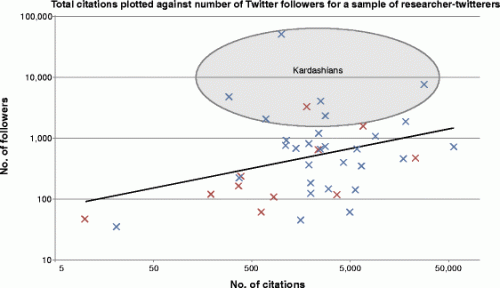August 5, 2014 report
Tongue-in-cheek 'Kardashian-index' raises awareness of cult of celebrity in sciences

(Phys.org) —Neil Hall, a genomics professor with the University of Liverpool, has kicked up a bit of an Internet storm. He's written a paper and has had it published in the journal Genome Biology, suggesting (with tongue firmly in cheek) that some scientists are getting more attention than they deserve, due to their heightened social standing. He's even come up with a way to measure it, his so-called "Kardashian-index" or more simply, K-index—it's derived by noting how many people are following the scientist on Twitter and then dividing that number by followers the scientist probably should have due to papers written and associated citations for it, i.e. proof of actual work done.
The index is named after Kim Kardashian (and her family) of course, who have become famous for being famous—they don't actually do anything. And that's the point of Hall's paper—is the scientific community in danger of being overrun by scientists who make a lot of noise in the social media world, but do very little actual scientific work? Hall notes that there seems to be times when scientists are asked to give talks at conferences based more on their social standing than on work they have actually done. This begs the question, are scientists (regardless of field) just as susceptible to the cult of celebrity as everyone else and if so, is it harming science?
Hall's K-index isn't going to help answer such questions, after all, a high index could mean that a scientist simply has an engaging social presence that has nothing to do with his or her professional life or accomplishments. But even that fact gives cause for wonder—if a scientist becomes famous among non-scientists (despite having done very little actual science) and is trotted out on talk shows and is proclaimed a prominent expert in their field, what impact does that have on non-scientists watching? Is it possible we could see scientists who become the academic world's version of pop singers who succeed due to their media presence rather than their (auto tuned) talent? It's hard to say of course, though not impossible to imagine.
Hall also notes something very serious he came across in his research, the lack of female scientists with a strong social presence—it's all related to a long history of women scientists being ignored by the scientific community, he bemoans, listing multiple examples of women that have been ignored by not only those in their field, but the general populace. Let's hope a high K-index isn't the fix.
More information: The Kardashian index: a measure of discrepant social media profile for scientists, Genome Biology 2014, 15:424 DOI: 10.1186/s13059-014-0424-0 , genomebiology.com/2014/15/7/424
Abstract
In the era of social media there are now many different ways that a scientist can build their public profile; the publication of high-quality scientific papers being just one. While social media is a valuable tool for outreach and the sharing of ideas, there is a danger that this form of communication is gaining too high a value and that we are losing sight of key metrics of scientific value, such as citation indices. To help quantify this, I propose the 'Kardashian Index', a measure of discrepancy between a scientist's social media profile and publication record based on the direct comparison of numbers of citations and Twitter followers.
Journal information: Genome Biology
© 2014 Phys.org


















